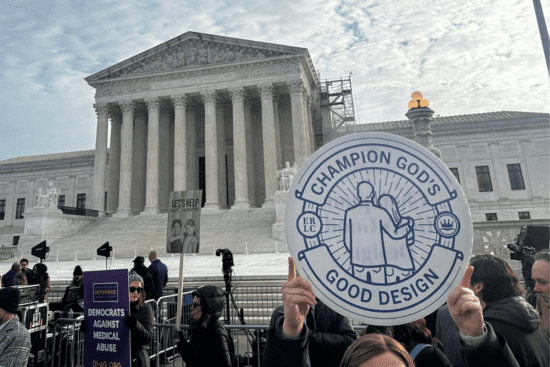I used to completely misunderstand Augustine. When it comes to Christianity and the public square, there is no more influential book than his famous City of God. He wrote that massive, 600-plus page work after Rome was sacked by the Visigoths in 410 A.D. Though he was writing to defend the faith against those blaming Christianity for Rome’s downfall—they blamed Christians for displacing Rome’s gods and saw the invasion as evidence of the gods’ anger and judgment—Augustine produced much more than a timely apology of the faith. Instead, City of God became an enduring articulation of the positive role of the Christian faith in society and culture.
The central framework of Augustine’s work is the idea of two cities existing in the world together: the city of man and the city of God. At the risk of oversimplifying Augustine’s primary illustration, he saw one city as devoted to the things of God while the other city is devoted to the things of the world. For a long time, I assumed I understood what Augustine meant. I thought he was suggesting Christians were members of both cities, that we are devoted to God as we live our lives in the world.
As it turns out, that concept is true and important, but it isn’t what Augustine meant at all. Instead, he drew the distinction between the city of man and the city of God to show us that Christians are members of one city—the city devoted to God—and not the other.
Debunking the Sacred/Secular Myth
Realizing that I had misunderstood Augustine led me to a second conclusion. Jesus tells us in his famous Sermon on the Mount that his people are to live in the world as salt and light. What do these two things have in common? They are distinct. Like me, many assume Augustine’s point was that Christians live like the world sometimes as members of the city of man but then live distinct from the world other times as members of the city of God.
But Augustine was actually saying what Jesus said: Christians are to be set apart from the world at all times. Salt is always distinct. Light is never darkness. And this has everything to do with the way that Christians are called to live in the world.
Some people believe that being distinct from the world requires withdrawing from the world. This shows up in various traditions, from Catholic monasteries to Amish communities. And while this may hold value for some, asceticism is not a real option for most Christians. Not only that, but it wasn’t the way that Jesus taught his disciples to live. And it wasn’t the way most of the Christians under Augustine’s ministry lived either.
In fact, when we explore the reason Jesus describes his followers as “the light of the world,” we learn that the world is supposed to see our lives. Jesus tells us the world is supposed to “see your good works and give glory to your Father who is in heaven” (Matt. 5:16).
Being salt and light means that Christians represent Jesus all the time. This is important because, for too long, Christians generally understood our lives to be divided into spheres: sacred and secular. We assumed that some things we do, like going to church or reading the Bible or going on a mission trip, were sacred things. Those were the holy parts of our lives that we committed to God. But the rest of our lives were secular. For most people, that includes their jobs and their hobbies and all the other things they do that don’t feel spiritual or religious.
The sacred/secular divide was a harmful development for the Church. It separated the Church into two classes of people: a professional ministerial class whose lives and vocations were dedicated to the sacred, and the rest of the church whose lives were mostly secular. The idea was that some Christians are called to a special kind of holy life dedicated to ministry, while most Christians were merely called to dedicate a few hours a week to holy things as they mostly supported (or observed) the ministry work of professional Christians. But this completely misses Jesus’ call toward discipleship.
Every Christian is a disciple of Jesus. And the call for every disciple is the same. We are to follow Jesus and live our lives in a way that reflects his life and brings glory and honor to him (Col. 3:17). This also means there is no professional class of Christians. Nor is there an actual divide between things sacred and secular in the life of the believer. If you are a follower of Jesus, everything you do is dedicated to him. He lays claim to our whole lives. And he sends us out to live as salt and light in the world.
This has significant implications for Christians when it comes to the public square. Because Jesus lays claim to all we are, there is nothing that we do apart from our identity as disciples. So whether you work on Wall Street or Main Street, your job is to take Jesus with you into that work. And that shapes everything from the way you pursue relationships with your co-workers to your work ethic to the actual work that you do. For the believer, nothing is ever truly secular because we never do anything apart from Jesus.
Bearing Witness to Jesus, All the Time
I’m writing this a few days after the conclusion of the 2022 Masters Tournament. I’m not an avid golf fan. But this particular year I got sucked in with all of the excitement surrounding Tiger Woods making a surprise appearance in Augusta. As the rounds went by, the eventual winner emerged at the top of the leaderboard. His name is Scottie Scheffler. And in the final round, all eyes were on him.
Naturally, the commentary focused on the details of Scheffler’s life, and as they did so, I learned that he is a serious Christian. And after winning his first major and the iconic green jacket, the 25-year-old golfer gave an interview in which he demonstrated what it means to live as salt and light. Scheffler said, “The reason why I play golf is I’m trying to glorify God and all that he’s done in my life.”1https://m.youtube.com/watch?v=EsGakPD0-Yo He also talked about a conversation he had with his wife beforehand where she reminded him that Jesus loved him regardless of how well he played.
Scheffler had the opportunity to bear witness to Jesus on one of the largest stages in professional sports. What made his testimony so meaningful was not his exemplary level of play (as stunning as it was), but the fact that his life had consistently demonstrated the distinctness of his faith. His words and actions—his character—out of the limelight stood in congruence with the words he spoke in his post-tournament interview about glorifying God as a golfer.
Scheffler’s testimony refutes the idea that there is a sacred/secular divide. He does not set aside his identity as a disciple when he steps out on the links. Instead, the whole of his life is a platform to point others to Jesus, and right now his career in the PGA is a central part of that platform. God willing, Scheffler will continue to use his gifts for this purpose. But as he recognized, neither God’s glory nor God’s love depend upon his success.
Lest we think one must be famous or exemplary to live as salt and light, we should remember that most followers of Jesus are actually very normal people (1 Cor. 1:26-27). Today they are teachers and doctors, truck drivers and lawyers, business owners and high school coaches. Some are pastors and missionaries and some are professional athletes, but most are none of those things. Regardless, all of us are called to bear witness to Jesus in our lives, words, work, and deeds.
This is true even for those Christians in the political arena. At this time, there are politicians and public servants at almost every level of government who are seeking to faithfully live as salt and light as they perform their duties as public servants. As they do so, their goal should always be to enact and support laws and policies that honor God and seek the good of their neighbors. (And though it is a discussion for another time, they can do all of this without ever threatening the separation of church and state).
The goal of living as salt and light is to let the world see Jesus in and through your life. When it comes to the public square, everywhere you find a Christian you should also find Jesus. Christians do not step in and out of the sacred parts of our lives. We bear witness to Jesus all the time, in everything we do. And together, we pray that the light emanating from the city of God will push back the darkness in the city of man.










